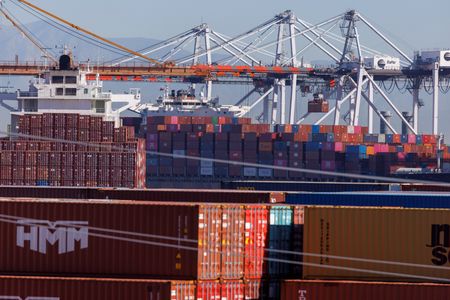 1
1 1
1

By David Shepardson
WASHINGTON (Reuters) -President Joe Biden on Thursday signed legislation to improve oversight of ocean shipping, which lawmakers say will help curb inflation and ease export backlogs.
The bipartisan bill passed the U.S. House of Representatives on a 369-42 vote earlier this week. Biden said he had “promised to crack down on ocean carriers whose price hikes have hurt American families.”
The new law boosts the investigatory authority of the Federal Maritime Commission (FMC), the U.S. agency that oversees ocean shipping, and increases transparency of industry practices.
“It’s going to help to begin to lower shipping costs,” Biden said.
The law will allow the FMC to launch probes of the business practices of ocean common carriers, a term that broadly refers to cargo vessels operating on the high seas.
It will also be able to apply enforcement measures and require the vessels to report to the FMC “total import/export tonnage” each calendar quarter. The law would bar ocean carriers from unreasonably declining opportunities for U.S. exports under new rules to be determined by the FMC.
The World Shipping Council said it will work with the FMC to implement the bill “in a way that will minimize disruption in our supply chain.”
However, it added: “Ocean carriers continue to move record volumes of cargo and have invested heavily in new capacity – America needs to make the same commitment and invest in its landside logistics infrastructure.”
The White House said the law will “make progress reducing costs for families and ensuring fair treatment for American businesses, including farmers and ranchers.”
Congress has few tools to combat inflation, which hit 8.6% in the 12 months through May, according to the U.S. consumer price index. Beyond the shipping bill, Democrats are also pushing measures to lower prescription drug prices.
Imports in the nation’s major retail container ports are expected to reach near-record volume in June as retailers seek to meet consumer demand and protect themselves from disruptions in West Coast ports, the National Retail Federation said in a statement last week.
(Reporting by David Shepardson; Editing by William Maclean and Richard Pullin)